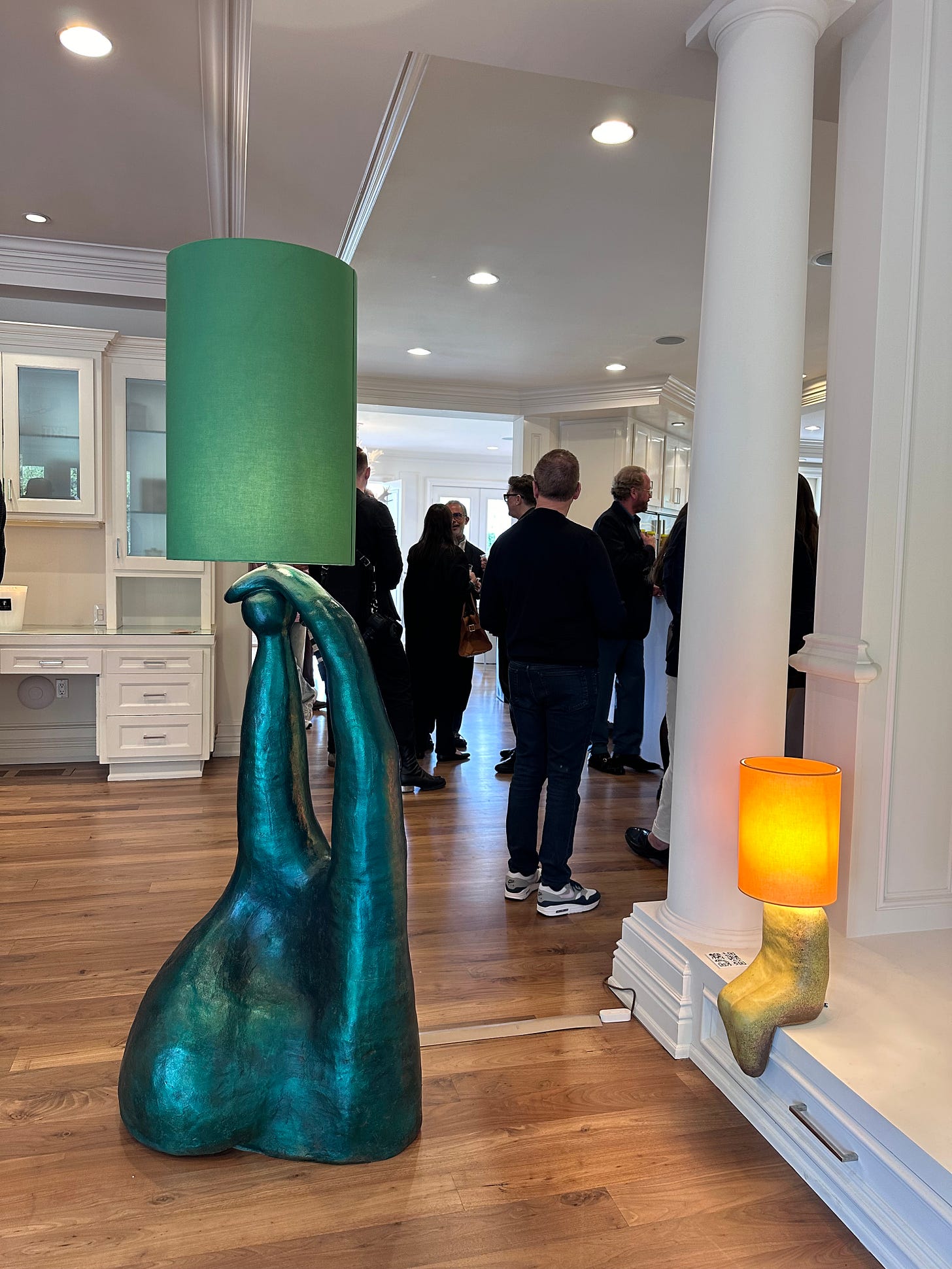Alright, alright, alright, it’s Friday which means it’s time for another installment of the heretofore unpublished third act of The Goddess Effect. Before we get to that, let me tell you about what’s transpired since we last spoke.

I leaned into myriad ways to avoid writing! This included a real estate hootenanny, a design fair in a $55 million estate, and martinis at my favorite place in Los Angeles to drink martinis.



Fear not, procrastination is part of the process.
Onto TGE. Chapter 20 spotlights Jay, a character who got cut in a subsequent revision. I like Jay. He’s more grounded than most of the folks at the Gig. A deejay and wannabe startup king, he’s making ends meet by doing Amazon deliveries and driving Uber. He’s come up with BarHop, a platform that’s like Zoom meets Twitch. If 2018 me only knew!
This was written before Amazon vans became as ubiquitous as they are now, and well before an imprint owned by Amazon bought The Goddess Effect. I was once asked if my mentions of Amazon were mandated by my publisher. Nope. It’s an ever-present entity in my life, as in the lives of many others.
This was also before Erewhon took over Los Angeles. Kale juicing mom could’ve used Erewhon.
20
Jay knew it saved gas, but he hated how his Prius seemed to turn off when he braked. The eco-stop function made it energy efficient, which was better for the environment, which he cared about somewhat, and better for his wallet, which he cared about more, but it felt unmanly, even more unmanly than he already felt, driving a hatchback with tail lights that looked like lightning bolts. He longed for a car with an engine that he could rev, something that he could drag race down Venice Boulevard after dark. You couldn’t drag race with a Prius.
The Nissan Leaf in front of him inched forward. The line of hybrids — they had to be hybrids, you’d be an idiot to sign up for this job and drive a gas guzzling SUV — appeared at least 50 deep, a chain of brilliant red brake lights that blinked on and off. Lately, the waiting times at the fulfillment facility in Santa Monica had gotten extra long. He could’ve changed his preferred location to Inglewood or Hawthorne, by the airport, but the nice thing about picking up packages in Santa Monica was that they were generally destined for homes in Santa Monica — or the Palisades, or Brentwood, or Malibu, places where Jay wasn’t afraid to leave his car running while he ran to the doorstep, boxes in hand.
The residents of Los Angeles’s nicer enclaves appeared to have given up on going outside to shop entirely, unless it was to the farmer’s market or Restoration Hardware. Even those rituals were in danger. Last week, he delivered 14 heads of kale to a frantic mom who flung open the door and ripped the bag out of his hands, explaining that she had a house full of teenage girls whining about wanting green juice and she refused to pay $8.00 each for the pre-made stuff to be ferried over from the cold pressed juice shop on the Third Street Promenade. Jay could have pointed out that her order hadn’t met Amazon’s $35 minimum to qualify for free delivery within two hours, and she probably would’ve spent the same amount of money plus saved herself the work of juicing all that kale had she just ordered from the shop, but Amazon subscribers generally didn’t like to be corrected by their deliverymen. He found that out the time he delivered six bags of gummy bears to a guy who opened the door and announced that his new vegan diet had come with some weird cravings.
“It’s only temporary, it’s only temporary,” he murmured to himself as his car inched forward. After his Uber for IV drips failed to raise any significant funding, plagued by regulatory and malpractice concerns that he found lame, he went back to the drawing board and came up with this Facebook for nightlife idea. Its thesis was simple: no one in L.A. really liked going out. Even with the advent of ride sharing, hopping from place to place was still a pain, it wasn’t like New York, where there were dozens of viable options within any given one block radius. He had tinkered around with video conference calling platforms and hacked together a proprietary one that could handle up to 20 members at a time, in up to 50 “bars,” which were really just video chat rooms with different backdrops: dive bar, sports bar, piano bar, bespoke cocktail bar. The idea was that the members would mix their own drinks at home and physically consume them while digitally mingling with whomever they liked. Having done enough deejay stints at actual bars to know what each type of venue played, Jay continually updated the playlists of each watering hole on his platform, ensuring the latest Rihanna track made it into the chic hotel lounge with a dance floor but not the deep south saloon.
The next step was to integrate virtual reality and set up live streams with brick and mortar versions of his avatar bars. That required money, and since BarHop was in “stealth mode,” aka, Jay was so afraid of being ridiculed that he hadn’t really told anyone about it yet, he had doubled down on making Amazon deliveries and gone dark on Uber. There was too much uncertainty with Uber. You didn’t know if the girl you were picking up was going on an hour long ride to her boyfriend’s place in Long Beach (good, as long as she didn’t spend the entire ride on the phone with him, whining about the traffic) or five minutes down the street to pick up her dry cleaning (waste of time). There was always the risk of picking up a passenger who was drunk, or high, or both, who might throw up in the car or ask if you could walk them to their door and then inelegantly try to shove your hand down their pants. Yes, there were Uber drivers who were rapists, sexual harassers, and really bad guys, but Jay had more than once been propositioned by passenger who’d stumbled into his car following last call or an especially boozy brunch, wanting him to give them the attention that their crushes or dates or Tinder mismatches had not.
After 20 minutes, he reached the mouth of the warehouse and pulled into his apportioned parking spot. An attendant wearing a walkie talkie and a safety vest came over and scanned the bar code that Jay pulled up on his phone. “You’re lucky, man,” he said, gesturing to the nearly empty metal racks that tended to overflow with cardboard boxes. “Not a ton left. Good luck.”
Keep reading with a 7-day free trial
Subscribe to Your Friend on the Ground to keep reading this post and get 7 days of free access to the full post archives.





